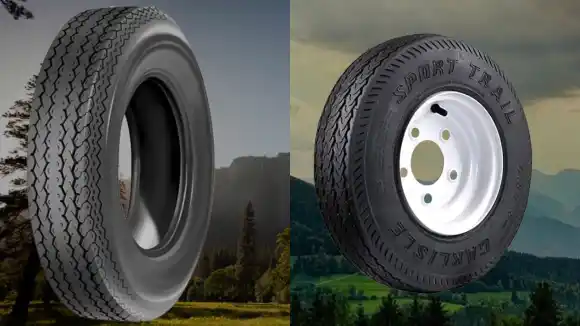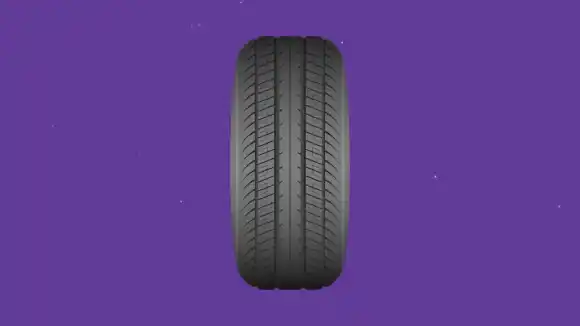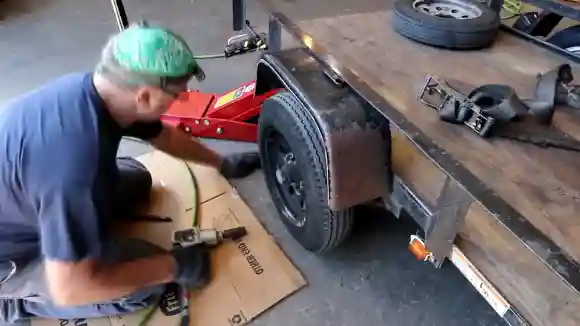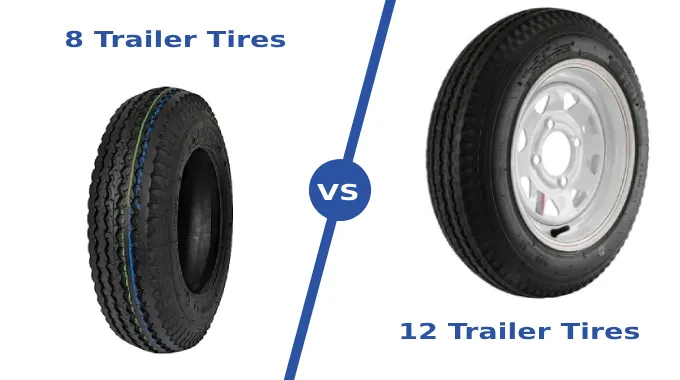Last Updated on September 25, 2023
Imagine you’re embarking on a journey, towing your prized possessions behind you. The open road stretches out before you, promising adventure and new horizons. But before you hit the pavement, there’s an important decision to make: 8 inch or 12 inch trailer tires?
To begin with, the weight and load capacity vary greatly between the two sizes. 8 tires have a lower load capacity and are suitable for lighter loads, while 12 tires can handle heavier loads with ease.
Next, the size and dimensions of the tires differ, with 12 tires being larger and providing better stability and traction on the road.
And the ply rating, rim diameter and width, as well as the tread type and depth, also vary between the two sizes, further highlighting the distinctions between them.
Here, we’ll discuss these differences between 8 and 12 inch RV trailer tires, revealing their unique characteristics and how they can impact your driving experience.
The Differences Between 8 vs 12 Trailer Tires

Regarding RV trailer tires, the differences between 8 and 12 tires are significant. The following information may vary depending on the brand and model. Here are 10 key differences based on the most common 8 and 12 inch trailer tire specs. Let’s see:
- No 01: Weight and Load Capacity
- No 02: Size and Dimensions
- No 03: Ply Rating
- No 04: Rim Diameter and Width
- No 05: Tread Type and Depth
- No 06: Speed Rating and Suitability
- No 07: Year-Round Performance
- No 08: Tubeless or Tube Tires
- No 09: Handling and Ride Characteristics
- No 10: Suitable for Heavy Loads
No 01: Weight and Load Capacity
In terms of weight, the 8-inch tire weighs in at a mere 9 pounds, making it a lightweight option for your trailer. As an alternative, the 12-inch tire weighs 10 pounds, slightly heavier but still manageable.
Now, let’s talk about load capacity. The 8-inch tire can handle up to 715 pounds, which is impressive considering its size. However, if you need to transport heavier loads, the 12-inch tire is the way to go, with a remarkable load capacity of 990 pounds.
Moreover, the 12-inch tire is designed to withstand the demands of RV trailer use, making it a durable and reliable choice. Opting for the 12-inch trailer tire offers you a stronger and more capable tire for all your hauling needs.
No 02: Size and Dimensions
Don’t miss out on the chance to explore the vast difference in size and dimensions between these two trailer tire options for RVs. It’s like comparing a towering skyscraper to a tiny pebble.
Regarding size and dimensions, the 12-inch tire takes the lead. Its overall diameter of 20.7 inches towers over the 8-inch tire’s 16.1 inches. The wider rim width of the 12-inch tire, measuring 4.9 inches, provides better stability and handling compared to the 8-inch tire’s 4.6 inches.
Additionally, the larger size of the 12-inch tire allows for greater ground clearance, reducing the risk of scraping or damaging the tire when navigating uneven terrain.
No 03: Ply Rating
With its higher ply rating, the 12-inch tire offers increased durability and strength, ensuring a safer and more reliable towing experience.
The ply rating refers to the number of layers of fabric used to construct the tire. In this case, the 4-ply rating of the 12-inch tire indicates that it’s constructed with four layers, making it more robust and resistant to punctures and impacts than the 2-ply 8-inch tire.
Additional layers provide enhanced stability and load carrying capacity, allowing the tire to handle heavier loads with ease. This makes the 12-inch tire ideal for trailers that are frequently used or subjected to rough terrains.
The higher ply rating also contributes to better traction and improved handling, ensuring the trailer stays securely attached and maneuverable on the road.
No 04: Rim Diameter and Width
The 12-inch tire’s larger rim diameter and width allow for improved stability and load-carrying capacity, making it a reliable choice for RV trailers operating in rough terrains.
With a rim diameter of 12 inches, this tire provides a sturdy foundation for the trailer, ensuring better balance and control while towing heavy loads.
Additionally, the wider width of the tire enhances its ability to distribute the weight evenly, reducing the risk of tire blowouts and increasing overall safety.
This larger size also offers better traction and grip on uneven surfaces, making it suitable for off-road adventures.
Furthermore, the spoked rim type and 5-hole bolt pattern add durability and strength to the tire, ensuring it can withstand the demands of heavy-duty trailer applications.
Additionally, 8-inch tire rim diameter limits its applications mainly to light-duty trailers. With a smaller width and lower load capacity, these tires are not advised for long-distance trips with heavy weight.
No 05: Tread Type and Depth

You’ll notice a significant difference in the tread type and depth between the 8-inch and 12-inch tires, emphasizing their distinct handling and ride characteristics.
The 8-inch tire features a trailer tread design specifically engineered to enhance handling and provide a smoother ride. This tread pattern is optimized for trailers, ensuring stability and control even when hauling heavy loads.
In contrast, the 12-inch tire has a symmetrical tread type with a depth of 0.24 inches. This particular tread design is versatile and suitable for various road conditions. The slightly deeper tread depth of the 12-inch tire offers improved traction and grip, promoting better performance and stability.
Whether you opt for the trailer tread of the 8-inch tire or the symmetrical tread of the 12-inch tire, both options are designed to optimize your RV trailer’s handling and ride quality.
No 06: Speed Rating and Suitability
Experience the thrill of the open road with the 8-inch tire’s lightning-fast speed rating, perfect for any adventure. With a speed rating of 55, this tire is specifically recommended for use on trailers. Its high-speed capabilities allow you to confidently navigate the highways and enjoy a smooth ride.
Alternatively, the 12-inch tire, with a speed rating of B, is more suitable for use on highways up to 31 mph for trailers. While it may not offer the same level of speed as the 8-inch tire, it still provides a reliable and safe option for your trailer needs.
No 07: Year-Round Performance
Get ready to conquer any terrain with these all-season tires that deliver top-notch performance all year round. Whether you’re hauling heavy loads or tackling rough conditions, the 8-inch and 12-inch trailer tires are designed to handle it all.
8-inch tires are ideal for use in both summer and winter seasons, while the 12-inch tires provide extra traction for more extreme conditions. With a D speed rating, these all-season trailer tires can handle speeds up to 65 mph without compromising safety or performance.
No 08: Tubeless or Tube Tires
The 8-inch trailer tire is tubeless, meaning it does not require an inner tube to hold air. Conversely, the 12-inch trailer tire uses a tube tire, which requires an inner tube to hold air.
With a tubeless tire like the one on the 8-inch trailer, there is less risk of punctures and leaks since there is no inner tube that can be damaged. This makes the tire more durable and reliable for use in rough conditions. Additionally, tubeless tires provide better fuel efficiency since there is less weight and friction with the road surface.
However, with a tube tire like the one on the 12-inch trailer, there is more flexibility regarding the types of vehicles the tire can be used on. Tube tires are compatible with a wider range of wheels, making them a more versatile option.
No 09: Handling and Ride Characteristics
The 8-inch tire’s trailer tread is designed to enhance handling and ride characteristics. This specialized tread pattern provides better traction and grip on various road surfaces, allowing for more control and stability while towing your RV trailer.
You can confidently navigate through curves and turns, knowing that the trailer tread will keep your trailer firmly planted on the road. The 8-inch tire’s trailer tread also helps to minimize rolling resistance, resulting in a smoother and more comfortable ride for you and your cargo.
Conversely, the 12-inch tire’s symmetrical tread type and steel construction offer additional advantages. The symmetrical tread pattern ensures even wear and improved stability, while the steel construction provides durability and strength.
With the 12-inch tire, you can expect a longer lifespan, reducing the need for frequent tire replacements. The steel construction also enhances the tire’s stability, allowing for better handling even when carrying heavier loads.
No 10: Suitable for Heavy Loads
For carrying heavy loads, the 12-inch trailer tire reigns supreme. With its 4-ply rating and load range of C, it is built to handle weights up to 990 pounds with ease. Meanwhile, the 8-inch trailer tire has a load index of 55 and a load capacity of 715 pounds. While respectable, it pales in comparison to the 12-inch tire.
The 12-inch tire’s construction of steel and symmetrical tread type make it suitable for rough conditions and year-round use. Its rim size of 12 inches and spoked rim type with a 5-hole bolt pattern provides added stability and durability.
On the other hand, the 8-inch tire has a ply rating of 2-Ply and a maximum load capacity of 590 pounds at 60 PSI. While it does exceed DOT requirements for performance, it is recommended for use on RV trailers and may not hold up as well under heavier loads or rougher conditions.
How fast can you drive with 12 inch trailer tires?

Driving at speeds exceeding 65 miles per hour for extended periods with 12-inch trailer tires rated for speed D may result in tire failure due to excessive heat build-up. It is important to note that these tires are specifically designed for trailers and are not intended for high-speed driving.
The speed rating of D indicates that the tires are suitable for speeds up to 65 miles per hour. Any faster than that, and the temperature inside the tire increases, which can lead to tire failure.
What are the Key Differences Between Carlisle and Hartland Trailer Tires?
Carlisle vs hartland trailer tires: key differences lie in their construction and performance. Carlisle tires are known for their durability and enhanced grip, making them suitable for various terrains. On the other hand, Hartland tires prioritize smooth rides and better shock absorption. It ultimately boils down to personal preferences, as both brands offer reliable and high-quality options for trailers.
What is the max speed for 8 inch trailer tires?
They usually run at a maximum speed of 65 mph with 8-inch trailer tires. However, the size of the tire can also impact its speed rating. For 8-inch trailer tires, the maximum speed rating may vary depending on the specific tire model and manufacturer.
It is crucial to consult the tire’s documentation or contact the manufacturer for the exact speed rating. Remember, exceeding the RV trailer recommended speed limit can lead to heat buildup, tire breakdown, and potential tire failure.
Are bigger trailer tires better?
Bigger trailer tires do offer advantages over smaller ones. The main benefit is the higher weight capacity they provide. With larger tires, you can carry heavier loads without compromising safety.
Additionally, the larger diameter of these tires makes them less affected by smaller bumps on the road. This means you’ll experience a smoother ride, as the larger tires are able to absorb and distribute the impact more effectively.
8 or 12 Trailer Tires: Make Your Trailer Tire Decision with Confidence
Now that you know the differences between 8 and 12 trailer tires, you can make an informed decision based on your specific needs.
The 12-inch tire offers several advantages, including a higher weight capacity, larger size and dimensions, higher ply rating for increased durability, and suitability for heavy loads.
On the other hand, the 8-inch tire is a lightweight option with a lower load capacity, smaller size and dimensions, lower ply rating, and limited suitability for light-duty applications.
When selecting RV trailer tires, it is important to consider the specific requirements of your trailer and the intended usage to ensure optimal performance, safety, and longevity.



